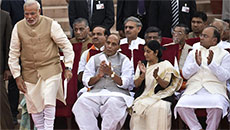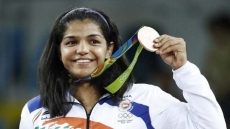When Chief Minister Mehbooba Mufti was asked to justify the Kashmir killings in the ongoing bloody unrest, she angrily walked out of the press conference she jointly addressed with Union Home Minister Rajnath Singh on Thursday.
Faced with tough questions, the Chief Minister also lashed out at the people of south Kashmir -- the bastion of her Peoples Democratic Party (PDP) -- saying it was she who saved them from the security forces fighting militancy in the valley.
Mehbooba has been a reluctant first woman Chief Minister of the state. When her father Mufti Mohammed Sayeed died in January this year, she took some three months before finally deciding to assume power because she wanted to put peoples' agenda first.
In the Kashmir Valley, when she wasn't in office, she was hailed as a peoples' politician who would attend funerals of slain militants, soothing their families and espousing for "self-rule" in the state.
But at Thursday's press conference, held towards the end of Rajnath Singh's two-day Kashmir visit at her official Fairview residence on the upscale Gupkar Road, revealed a new side -- an angry one -- of Mehbooba, often referred to as a soft-separatist while in the opposition.

She was so angry that she abruptly ended the news conference with a "thank you" even as Rajnath Singh, on her right, was still seated and looking at journalists for more questions.
As Mehbooba's anger was brewing, the Home Minister, smiling but apparently uneasy, gestured to her with his left hand, seemingly asking her to calm down.
But she stood up, not completing her answer. A reluctant Home Minister was left with no choice but to follow her.
Mehbooba was agitated when a journalist asked her about the alleged disproportionate use of force against civilian protesters and if she had swapped her role and views with her predecessor Omar Abdullah, who was ruling the state during the 2010 unrest when nearly 120 civilians were killed.
"Don't mix or compare the two situations. You are making a bad analysis of what you are saying. In 2010, there was a fake encounter. Three civilians were killed. That means there was a reason for people to be angry.
"Today, there was an encounter in which three militants were killed. How is the government to be blamed for that," she shot back, raising her voice.

She said people came out on the roads after the July 8 killing of Hizbul Mujahideen commander Burhan Wani even though the government had imposed a strict curfew.
"Had a kid gone to buy a toffee from an army camp? A 15-year-old boy who attacked a police station in Damhal Hanjipora (south Kashmir) had not gone to fetch milk. Don't compare the two," she thundered.
She hit at protesters in south Kashmir -- the worst-affected region in the current unrest where most of the nearly 70 deaths have occurred.
In her angry outburst, the PDP chief said it was she who saved the people of the south from "the edge of a knife, when they used to run away after seeing gypsies (vans) of the Task Force" -- a reference to the Special Operations Group of Jammu and Kashmir Police set up to battle militancy.
"What will they tell me? I saved them when they were being taken to begaar (forced labour), when they were being taken to cut the grass in south Kashmir. I have got them out... from those terrible situations when (security forces) used to check their identities."
As scribes kept asking questions, the Home Minister tried to pacify her by telling the journalists, "Mehbooba ji is from among you."
However, Mehbooba got up and asked journalists for a cup of tea. But they refused.
INDIA'S FUTURE INCOMPLETE WITHOUT PEACEFUL KASHMIR

Union Home Minister Rajnath Singh on Thursday made a passionate appeal for peace in the Kashmir valley, saying India's future was incomplete without a peaceful Kashmir but it cut no ice with separatists who have been spearheading a protracted violent unrest that has claimed at least 69 lives since July 9.
Announcing that an all-party delegation will visit the state soon for talks, Rajnath Singh also conceded a popular demand to have an alternative “in a few days” to the use of pellet guns as a tool to control unruly mobs.
The Home Minister said that during his stay in Srinagar he met some 300 people, including leaders of all mainstream political parties in the state, with whom he had “good talks”.
“Everybody wants peace to be restored. We are extremely sad over the situation. We are pained over the loss of lives," the minister said with Chief Minister Mehbooba Mufti by his side.
In an oblique reference to separatist leaders, the Home Minister said people should "not play with the future of Kashmiri youth".
"They (youth) should hold books, pens and laptops in their hands and not stones," he said. "We are linking the future of Kashmiri youth with the future of India. And I appeal to Kashmiri people to identify those who are creating trouble."
India's future, he said, is intrinsically linked to the future of Kashmir.

He said leaders of all political parties will soon visit here for talks on finding ways to break the logjam in the valley. "I have asked the state government to make all preparations for that."
Asked if he invited separatist leaders for talks, Rajnath Singh said the government was ready to hold talks with anyone who believed in "insaniyat, jamhooriyat and Kashmiriyat".
Notably, he didn't name Pakistan for stoking trouble in the valley and didn't repeat that talks over Kashmir will only be held under the provisions of the Constitution of India -- unlike previously.
Separatist leaders rejected the offer saying the Home Minister's visit was a futile exercise as long as the government didn't accept Kashmir as a “dispute” that needs a resolution through talks between India, Pakistan and the people of the state.
Leaders of both factions of the separatist Hurriyat Conference refused further comment on the Minister's visit.
The opposition Congress said the government needed “to move beyond the rhetoric”.
“Action on the ground is needed. A political dialogue with all stakeholders is suggested," Congress spokesperson Randeep Singh Surjewala told reporters in Delhi.
It was the Minister's second visit to the valley in a month since the unrest, the deadliest in six years, erupted after the July 8 killing of Hizbul Mujahideen commander Burhan Wani.
At least 69 civilians have been killed and thousands injured in firing by security forces at pro-freedom demonstrators. Most of the injuries have been caused by pellet guns that have left hundreds partially or fully blinded.
Mehbooba Mufti justified the killings by security forces saying those hit by bullets or pellets had not gone to fetch milk or candies.

She was asked how she justified the alleged disproportionate use of force against Kashmiri protestors when as opposition leader she had criticised the government during a similar unrest in 2010 for civilian killings. The Chief Minister got angry and asked a reporter not to compare the two situations.
"You are wrong. What happened in 2010 had a reason. There was a fake encounter in Machil. Three civilians were killed. Today three militants were killed in an encounter and how is the government to be blamed for that," she said.
She said people defied curfew and came out on the roads after Wani's killing.
"Had a kid gone to buy a toffee from an army camp? A 15-year-old boy who attacked a police station (in south Kashmir), had he gone to buy milk," she asked, adding that only five per cent of Kashmiri population were resorting to violence while the remaining 95 per cent wanted a dialogue to solve the issue peacefully.
The Home Minister earlier met leaders of all mainstream parties and officials of civil, security and intelligence agencies. Trade bodies in Kashmir refused to meet him in protest against the civilian killings.
Meanwhile, the situation in the valley on the 47th day of unrest remained calm but tense amid stiff curfew and shutdown called by separatists.
Sporadic incidents of stone-pelting occurred at six places in Srinagar, Sopore, Kupwara and Bandipora, a police spokesman said. At least a dozen people were injured in these incidents.



